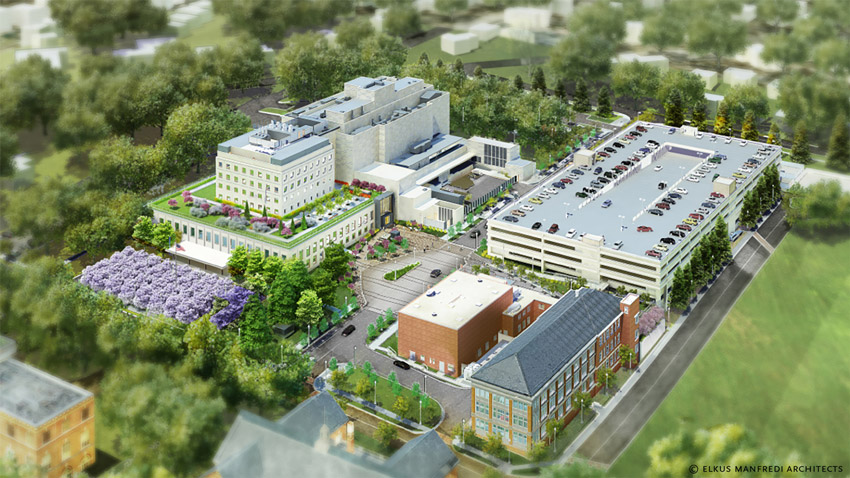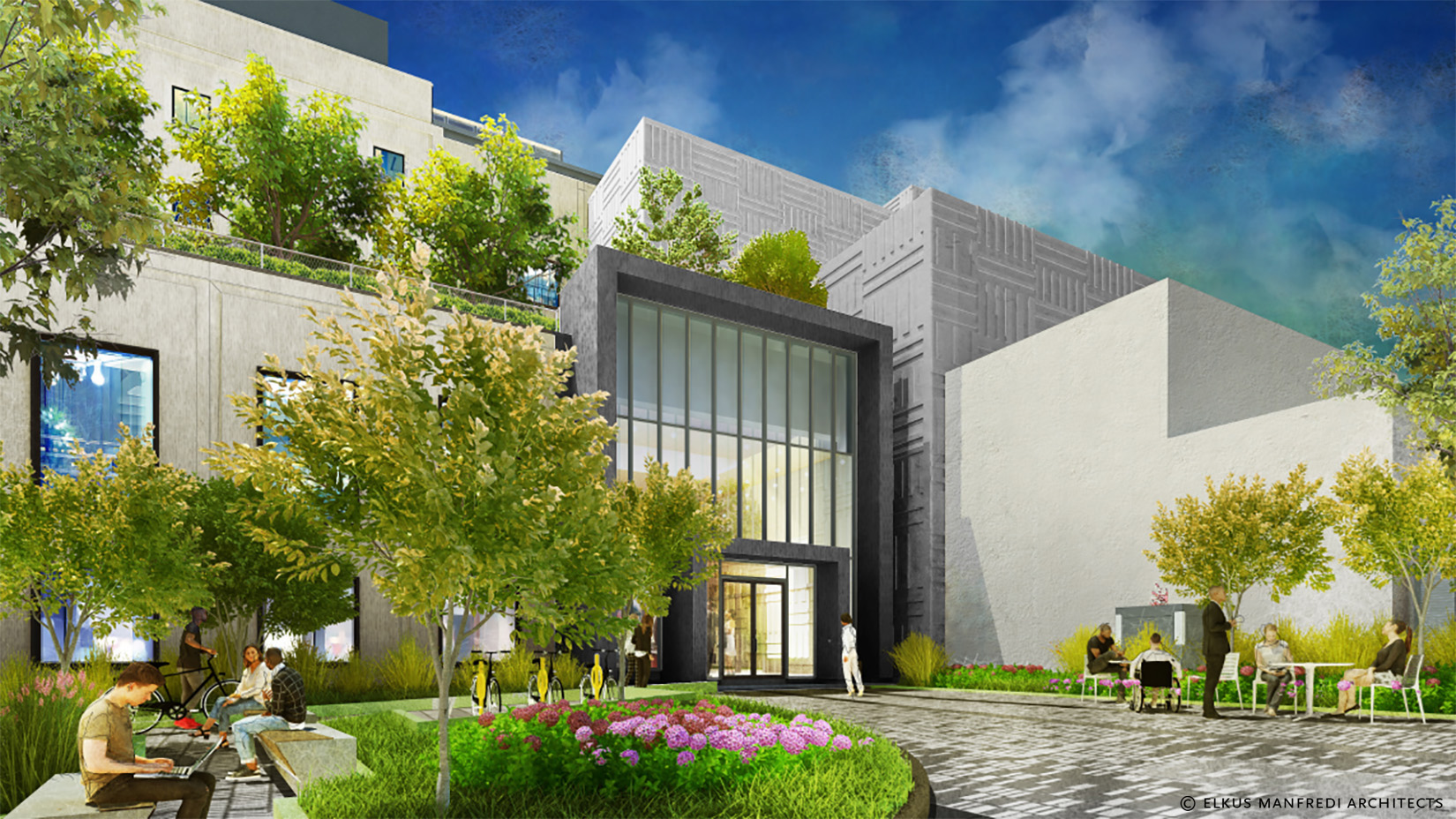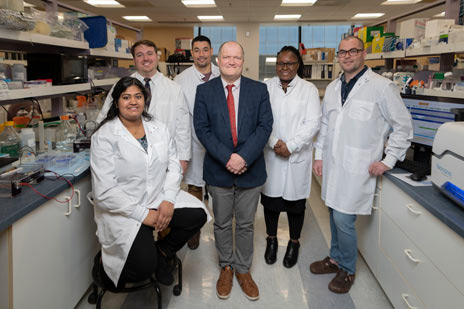Children’s National Research Institute Academic Annual report 2019-2020

Feature Story
Children’s National Research & Innovation Campus (CNRIC) Features Partnerships with Johnson & Johnson Innovation | JLABS and Virginia Tech
In 2018, Children’s National Hospital began construction of its new Research & Innovation Campus (CNRIC) on 12 acres of land transferred by the U.S. Army as part of the decommissioning of the former Walter Reed Army Medical Center campus.
The historic Army medical center opened in 1909, providing care for military personnel and conducting research committed to diagnosing and treating rare and complex diseases. Its storied history will live on, as Children’s National renovations work to restore many of the buildings to be used for purposes similar to their original intent.
Children’s National is currently redeveloping 360,000 square feet of space for the furthering of pediatric research, innovation and patient care. In alignment with the 150th birthday of Children’s National Hospital, 2020 will mark the completion of phase one of the project and the opening of the first 160,000 square feet of research space on the campus.
The first phase of development will provide the opportunity to develop a unique ecosystem focused on Precision Medicine, bringing together complementary and synergistic areas of genomic medicine"
The first phase of development will provide the opportunity to develop a unique ecosystem focused on Precision Medicine, bringing together complementary and synergistic areas of genomic medicine, including a state-of-the-art research center with a global genomic health vision encompassed by the Center forGenetic Medicine Research (CGMR), a premier Clinical Laboratory Program (CLP) focused on molecular genetic testing and biochemical analysis, and a world-class clinical and research program hosted by the Rare Disease Institute (RDI). This unique ecosystem is at the intersection of genomics (data analysis and interpretation), phenomics (clinical informatics and phenotype standardization), laboratory data reporting and clinical care. Children’s National is uniquely positioned to play a leading role in this field. Teams of professionals with expertise in regulatory science, bioethics, research operations, contracting and finances also enhance the program. Overall, the Precision Medicine program will combine research with business opportunities and clinical health benefits. Additional Children’s National Research Institute (CNRI) centers will move to the campus in the next phase of development.
“Our Research & Innovation Campus will be a place that enhances collaboration in a state-of-the-art, technologically advanced research environment. The difference in perspectives and backgrounds of the scientists will encourage both formal and informal exchanges of ideas,” said Mark L. Batshaw, M.D., Children’s National’s chief academic officer and physician-in-chief. Children’s National will serve as the anchor institution around which researchers, innovators, startup companies, academic and industry partners, community members and government agencies can perform research and innovation in an accessible, urban ecosystem.

Key partners in developing this first in class, pediatric-focused innovation district include Johnson & Johnson Innovation, JLABS and Virginia Polytechnic Institute and State University (Virginia Tech). Washington, D.C., Mayor Muriel Bowser helped welcome Children’s National and its partners to the campus, highlighting the health and tech industry talent and ideas that will “further strengthen D.C.’s status as the capital of inclusive innovation.”
Washington, D.C., Mayor Muriel Bowser helped welcome Children’s National and its partners to the campus, highlighting the health and tech industry talent and ideas that will ‘further strengthen D.C.’s status as the capital of inclusive innovation.’"
Johnson & Johnson Innovation announced the establishment of JLABS @ Washington, DC, which will operate as a life sciences incubator for global health-care solutions and innovation. JLABS @ Washington, DC resident companies will explore areas of opportunity within consumer, medical device and biopharmaceutical development, including pediatric health, to drive discoveries and apply them to treatments and technologies. It will benefit from the surrounding community of local academic medical centers, universities and government agencies that are on the forefront of scientific and health-care advancements. In return, JLABS @ Washington, DC will bring innovators and start-up companies to the research and innovation campus and serve as a hub for connecting them to funding opportunities, third-party services, education and research and development expertise.
“With JLABS @ Washington, DC housed at this one-of-a-kind facility for pediatric research, we complement the Children’s National mission while further strengthening and expanding the region’s network to encompass the full breadth of science and technology innovators who are focused on developing transformative solutions to improve lives,” said Melinda Richter, global head of Johnson & Johnson Innovation, JLABS. “In this model, our goal is to provide a platform for innovators to be ‘heroes in their own hometown’ while enhancing and saving lives, including those of our most precious and vulnerable, all over the world.”
Virginia Tech — a leading university in engineering, technology and biomedical innovation — will be another significant contributor to the research being done at the CNRIC and will launch a biomedical research facility focused on pediatric brain cancer. In their new research facility, the Virginia Tech teams will have dedicated space and resources to support their efforts in developing new drugs, medical devices, software applications, diagnostics and treatments. CNRI and Virginia Tech will focus their collaborations on innovation and translation of fundamental discoveries into preventions, diagnostics, treatments and cures for children with brain cancer, building on the existing 10-year relationship between faculty from CNRI and the Fralin Biomedical Research Institute at Virginia Tech Carilion in Roanoke. Virginia Tech’s involvement in the new campus will expand its footprint in the Washington, D.C., area, where the university has multiple existing campuses and is in the process of developing a graduate campus for engineering, computer science and technological innovation in the backyard of the new Arlington Amazon headquarters.
“This enhancement of the already strong collaborative research relationship between CNRI and Virginia Tech represents an immense opportunity to improve the health and lives of children,” said Michael Friedlander, Virginia Tech’s vice president for health sciences and technology and the executive director of the Fralin Biomedical Research Institute in Roanoke. “Virginia Tech’s motto, Ut Prosim (that I may serve), is embodied in this partnership. Together, Virginia Tech and Children’s National will bring the power of science and the compassion of our institutions’ people and cultures to bear on achieving the goal of preventing or eliminating brain cancer in children — we can do it together.”
Additional planned developments within the Children’s National Research & Innovation Campus in 2020 include the transformation of the former Post Theater into a conference center, the renovation of an outpatient and specialty pediatric care center and construction of an ADA (Americans with Disabilities Act)-compliant parking garage. Within the broader, former-Walter Reed Campus, Children’s National will be joined by nonprofit organizations, schools, retail businesses, housing and a foreign missions center, all embedded in and supportive of the local community. An independent analysis concluded that the completion of the Children’s National Research & Innovation Campus will infuse the local economy with as much as $150 million through 2020, and it has the potential to grow to as much as $6.2 billion in economic benefit by 2030 and create 2,100 permanent jobs.
Vittorio Gallo, Ph.D., chief research officer, Children’s National, said, “We are creating a Research & Innovation Campus and ecosystem that will allow us to attract world-class faculty and innovators, train the next generations of scientists and enable us to amplify global pediatric care and research efforts.”

